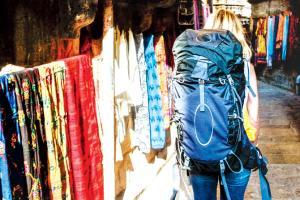To expect truth from advertising agencies is a farfetched thought, but visitors to our cities should be warned nonetheless

In recent times, communal violence has deterred domestic tourists from visiting cities in the North East. Representation pic
 What would your idea of an advertisement for the Incredible India campaign look like? It’s a question I sometimes ask friends at a bar, when we’re drunk enough to be honest about how we really feel about life, our country, and everything in between. Their responses are always interesting, but also revealing because they emphasise how much we value the idea of saving face. We want the world to look at India as a place of love and affection, beauty and caring, clean streets and cleaner people, because any view that deviates from this ideal state only makes us look bad.
What would your idea of an advertisement for the Incredible India campaign look like? It’s a question I sometimes ask friends at a bar, when we’re drunk enough to be honest about how we really feel about life, our country, and everything in between. Their responses are always interesting, but also revealing because they emphasise how much we value the idea of saving face. We want the world to look at India as a place of love and affection, beauty and caring, clean streets and cleaner people, because any view that deviates from this ideal state only makes us look bad.
ADVERTISEMENT
We do this in our private lives, too, of course, lower our voices and smile at the neighbours to prevent them from finding out about the mental ailments that run in so many families. We bring out the best China and borrow money to feed relatives because what they think about us matters a lot more than anything else. It’s also why marriage ceremonies continue to stress out millions of Indians, as they prepare for lifelong debt just to create a fleeting impression of success.
The Incredible India ads do show India in a positive light because the advertising agencies tasked with creating them are paid to do so. As tools to be brandished by our tourism ministry, they function rather well. It’s sad that we can’t really be honest though, because honesty about who we are as a country and a people would frighten a lot more visitors from turning up. We have to rely on our ancient and glorious past because the present would be devastating for most sane people to stomach. We have to show tigers and temples because showing them our streets and how we commute would make them cancel their bookings in a hurry.
My friends usually describe their ideal ads as ones featuring people spitting paan, leering at women and jostling for space at railway stations. They end these descriptions with a laugh though, because they recognise the impossibility of these honest snapshots of daily life ever making it to those advertisements. Honesty is for tweets by tourists who complain about how they are routinely fleeced, followed and harassed for all kinds of reasons.
In recent times, communal violence has deterred domestic tourists from visiting cities in the North East. A tourist was allegedly killed by stone-throwing protesters in Kashmir. A British couple was beaten up in Bihar and there were two attacks on foreign tourists in Uttar Pradesh within two weeks. There have also been a reported 245 deaths of tourists to Goa in 12 years. These reports are routinely dismissed with statements about how all countries are dangerous. No government ever address the fundamental flaw that lies in our ability to treat other human beings with respect.
The official website of the British government has this foreign travel advice to offer at present: ‘Women should use caution when travelling in India. Reported cases of sexual assault against women and young girls are increasing; recent sexual attacks against female visitors in tourist areas and cities show that foreign women are also at risk.’ A government that took this advice seriously would do something to make not just foreign visitors feel safer in our country. Instead, more and more Indian women talk about how unsafe they feel in their own country. Their complaints are dismissed, too, as rumour-mongering generated by ‘anti-nationals’ trying to tarnish our fair country’s reputation.
What would your idea of those Incredible Indian advertisements be? Would you like them to focus on our ancient glory and natural wonders alone, or show the world that our country still has something positive to offer? Wouldn’t it be nice to not have to lie for a change? To tell the world that our obsession with politics and religion is turning us into a country of hateful fanatics? That our inability to deal with sexual repression makes our country dangerous for women? That we are racists who simply haven’t come to terms with our racism?
The advertisements will no doubt continue to lie. After all, we live in a country where a high-ranking minister once asked us to downplay the horrific gang-rape of a girl who lost her life, because of how it was giving the country a bad name. People don’t matter to us. Only perception does.
When he isn’t ranting about all things Mumbai, Lindsay Pereira can be almost sweet. He tweets @lindsaypereira Send your feedback to mailbag@mid-day.com
Catch up on all the latest Crime, National, International and Hatke news here. Also download the new mid-day Android and iOS apps to get latest updates
 Subscribe today by clicking the link and stay updated with the latest news!" Click here!
Subscribe today by clicking the link and stay updated with the latest news!" Click here!






